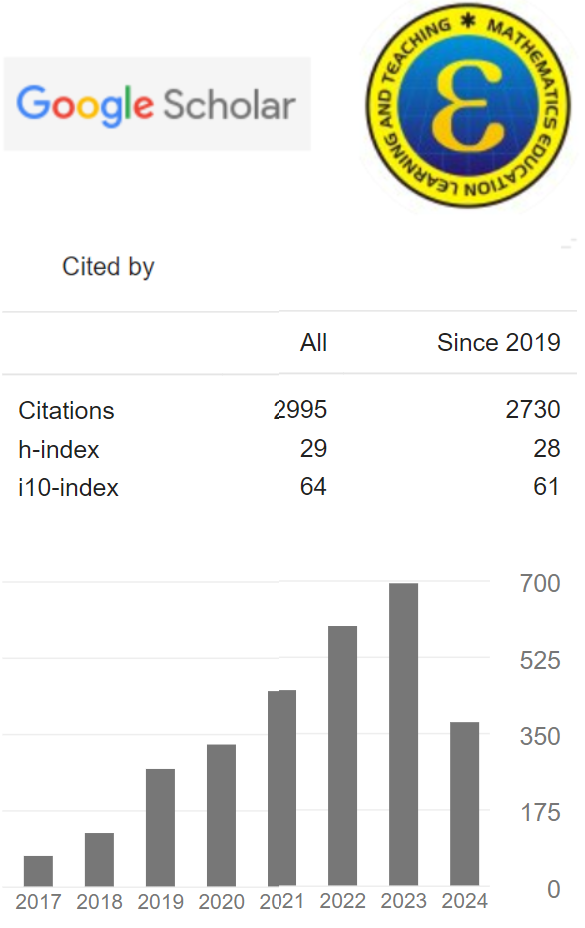Exploration of Learning Obstacle Based on Mathematical Understanding of Algebra in Junior High School
(1) Universitas Swadaya Gunung Djati
(2) Universitas Swadaya Gunung Djati
(3) Universitas Swadaya Gunung Djati
(*) Corresponding Author
Abstract
Keywords
Full Text:
PDFReferences
Astuti & Sari, N. (2018). Analisis kesulitan belajar struktur aljabar di STKIP Pahlawan Tuanku Tambusai. Jurnal Pendidikan Matematika, 12 (2), 73 - 80. https://doi.org/10.22342/jpm.12.2.4142.73-80
Badaruddin, D. P., Tengah, K. A., & Prahmana, R. C. I. (2018). Enhancing manipulation of algebraic equation through Balance Method. Journal of Physics: Conference Series, 1088(1), 012007. https://doi.org/10.1088/1742-6596/1088/1/012007
Booth, J. L., & Koedinger, K. R. (2008). Key misconceptions in algebraic problem solving. Proceedings of the Annual Meeting of the Cognitive Science Society, 30(30), 571-576. https://escholarship.org/uc/item/5n28t12n
Booth, J. L., Barbieri, C., Eyer, F., & Paré-Blagoev, E. J. (2014). Persistent and pernicious errors in algebraic problem solving. The Journal of Problem Solving, 7(1), 10-23. https://doi.org/10.7771/1932-6246.1161
Brousseau, G. (2002). Theory of didactical situations in mathematics: Didactique des mathématiques, 1970–1990 (Vol. 19). Springer Science & Business Media.
Chotimah, S. (2014). Upaya Meningkatkan Kemampuan Pemahaman Matematik Siswa dengan Pendekatan Realistic Mathematics Educations pada Siswa SMP di Kota Bandung. Prosiding Seminar Nasional Pendidikan Matematika. 2, (pp.133-139). Cimahi: STKIP Siliwangi.
Firdaus, F., Kailani, I., Bakar, M. N. B., & Bakry, B. (2015). Developing critical thinking skills of students in mathematics learning. Journal of Education and Learning, 9(3), 226-23 https://doi.org/10.11591/edulearn.v9i3.1830
Hendriana, H., Rohaeti, E. E., & Sumarmo, U. (2017). Hard skills dan soft skills matematik siswa. Bandung: Refika Aditama.
Hendriana, H., & Soemarmo, U. (2014). Penilaian pembelajaran matematika. Bandung: Refika Aditama.
Lange, K. E., Booth, J. L., & Newton, K. J. (2014). Learning algebra from worked examples. MatheMatics teacher, 107(7), 534-540. https://doi.org/10.5951/mathteacher.107.7.0534
Malihatuddarojah, D., & Prahmana, R. C. I. (2019). Analisis Kesalahan Siswa dalam Menyelesaikan Permasalahan Operasi Bentuk Aljabar. Jurnal Pendidikan Matematika, 13(1), 1-8. https://doi.org/10.22342/jpm.13.1.6668.1-8
Mulyani, A., Indah, E. K. N., & Satria, A. P. (2018). Analisis Kemampuan Pemahaman Matematis Siswa SMP pada Materi Bentuk Aljabar. Mosharafa: Jurnal Pendidikan Matematika, 7(2), 251-262. https://doi.org/10.31980/mosharafa.v7i2.24
NCTM (2000). Principles and Standards for School Mathematics. Reston, VA: The National Council of Teachers of Mathematics, Inc.
Nugraha, N., Kadarisma, G., & Setiawan, W. (2019). Analisis Kesulitan Belajar Matematika Materi Bentuk Aljabar Pada Siswa SMP Kelas VII. Journal on Education, 1(2), 323-334. Retrieved from http://jonedu.org/index.php/joe/article/view/72
Purwasih, R. (2015). Peningkatan Kemampuan Pemahaman Matematis dan Self Confidence Siswa MTS di Kota Cimahi Melalui Model Pembelajaran Inkuiri Terbimbing. Didaktik, 9(1), 16-25. Retrieved from http://e-journal.stkipsiliwangi.ac.id/index.php/didaktik/article/view/113
Saputro, B. A., Suryadi, D., Rosjanuardi, R., & Karta sasmita, B. G. (2018). Analysis of students’ errors in responding to TIMSS domain algebra problem. Journal of Physics: Conference Series , 1088 (1), 012031. https://doi.org/10.1088/1742-6596/1088/1/012031
Suryadi, D. (2013). Didactical design research (DDR) to improve the teaching of mathematics. Far East Journal of Mathematical Education, 10(1), 91-107.
Uno, H. B. (2007). Model pembelajaran menciptakan proses belajar mengajar yang kreatif dan efektif. Jakarta: Bumi Aksara.
Utami, R. (2019). Analisis Miskonsepsi Siswa Dan Cara Mengatasinya Pada Materi Bentuk Aljabar Kelas VII-C SMP Negeri 13 Malang. JPM: Jurnal Pendidikan Matematika, 3(1), 37-44. https://doi.org/10.33474/jpm.v3i1.2606
Wulandari, P., Mujib, M., & Putra, F. G. (2016). Pengaruh model pembelajaran investigasi kelompok berbantuan perangkat lunak MAPLE terhadap kemampuan pemecahan masalah matematis. Al-Jabar: Jurnal Pendidikan Matematika, 7(1), 101-106. https://doi.org/10.23887/jppm.v8i2.2853
Zubainur, C. M., & Ali, R. M. (2018, September). Cognitive conflict strategy to minimize students’ misconception on the topic of addition of algebraic expression. In Journal of Physics: Conference Series (Vol. 1088, No. 1, p. 012084). IOP Publishing. https://doi.org/10.1088/1742-6596/1088/1/012084
DOI: 10.24235/eduma.v9i1.5946
Article Metrics
Abstract view : 204 timesPDF - 49 times
Refbacks
- There are currently no refbacks.
Copyright (c) 2020


.png)










